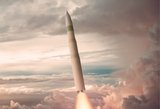US stands by Afghans after deadly day for journalists
Defense Secretary Jim Mattis said Tuesday the US would stand by the Afghan people and the Kabul government, a day after attacks killed dozens of people including 10 journalists.
'The murder of journalists and other innocent people is a great testimony to what it is we stand for, and more importantly what we stand against,' Mattis told reporters at the Pentagon.
'We'll stand by the Afghan people, we'll stand by the Afghan government and the NATO mission will continue as we drive them to a political settlement,' he added.
The Pentagon chief had earlier said that weakened militants were targeting journalists in Afghanistan in order to undermine the electoral process ahead of an expected vote in October.
Monday's bloodshed saw a double suicide blast in Kabul that left 25 people dead including AFP's chief Afghanistan photographer Shah Marai and eight other journalists.
The Islamic State group, which has dramatically stepped up its attacks in Kabul in recent months, claimed the attack.
A separate shooting in eastern Khost province killed a BBC reporter.
'We anticipated and are doing our best and have been successful at blocking many of these attacks on innocent people, but unfortunately once in a while they get through,' Mattis said as he greeted Macedonian Deputy Prime Minister and Defense Minister Radmila Sekerinska.
'This is simply what they do: They murder innocent people.'
Secretary of State Mike Pompeo has also condemned the "senseless and barbaric attack." He said the work of those journalists who died 'helped lay the foundation for Afghanistan's thriving and resilient independent media.'
As the Pentagon asserts that Afghan troops and US-led NATO forces are making steady progress in the 16.5-year-old Afghanistan war, a US watchdog on Tuesday warned that the Taliban and other insurgent groups are gaining control over increasing numbers of the Afghan population and the strength of local security forces has declined sharply.
More from Defence Notes
-
![New opportunities for defence firms as EU steps up support for Ukraine]()
New opportunities for defence firms as EU steps up support for Ukraine
The European Commission is looking for startups and other innovators to address challenges across the land, air and sea domains.
-
![Why small guns have been critical to layered CUAS architectures]()
Why small guns have been critical to layered CUAS architectures
Multiple countries have been deploying small arms as the last line of drone defence due to their multiple operational and tactical advantages.
-
![Singapore Airshow 2026: ST Engineering hints at export success for AME assault rifle family]()
Singapore Airshow 2026: ST Engineering hints at export success for AME assault rifle family
The Singapore-based technology company unveiled its new rifle family at this week’s airshow. Chen Chuanren spoke with the ST Engineering’s head of small arms to find out more about how the weapons have been refined.
-
![High tension in the High North – a wake-up call for NATO’s future Arctic defence efforts?]()
High tension in the High North – a wake-up call for NATO’s future Arctic defence efforts?
Any potential ‘Arctic Sentry’ mission would be months in the planning, but with tensions high in the region given the US’s push for Greenland, NATO countries will need to continue to emphasise their commitment to the region, analysts have said.
























